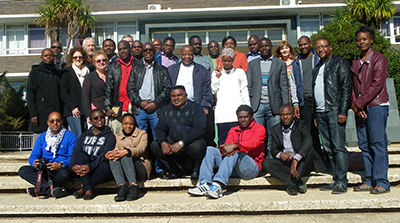Latest News Archive
Please select Category, Year, and then Month to display items
04 October 2024
|
Story Dr Cindé Greyling
|
Photo Supplied
 Scan the QR Code to unlock 30 days of exciting challenges to enhance your mental well-being.
Scan the QR Code to unlock 30 days of exciting challenges to enhance your mental well-being.
During October this year, the University of the Free State (UFS) Department of Student Counselling and Development (SCD) invites all staff and students to play an active part in their own mental health. Every day. You can do one small thing each day to improve your mental health. That is why the campaign is called DoDay – do something today and make it a do
day.
For 30 days, doable mental health activities will be shared on the UFS and SCD Instagram and Facebook pages. You will be invited to participate in the activity and to share your experience online. We encourage you to take up the challenge and share the skills for better mental health.
Be successful
As we approach the mid-year exam when staff and students are experiencing added pressure and anxiety, it is the perfect time to dedicate 10 to 15 minutes daily to your mental health. Each week we will focus on five different mental health building blocks: social wellness, emotional wellness, intellectual wellness, physical wellness, and spiritual wellness. By participating in the different activities each day, you will cover all the different wellness areas.
Be informed
During the campaign, we will also release insightful podcast interviews with experts who share their personal and professional experiences with each wellness area. It is no secret that communities are stronger together. Let us all work towards collectively improving our mental well-being and supporting one another on this journey.
Be happy
Improved mental health supports your professional and academic performance. It also helps you to make better decisions and enjoy life more. Improving your mental well-being has never been easier than following the DoDay calendar. You will receive clear guidelines on what to do each day, and you can mark off your progress and share your activities as you go.
Be a DoDay-er
Remember that maintaining mental well-being is like brushing your teeth, so we recommend it daily! Join the UFS Mental Health DoDay drive and take one small daily action for 30 days towards better mental health. Download your 30-day DoDay calendar – and remember to share and inspire others. Make every day a Mental Health DoDay
First CAS Winter School brings researchers together
2016-08-01

International and University of the Free State delegates
during the three day Centre for Africa Studies
winter school.
Photo: Supplied
The first biennial doctoral Winter School by the Centre for Africa Studies at the University of the Free State (UFS) brought together UFS PhD researchers as well as current and new Africa Studies students specialising in the Conflict and Peace subfield.
According to Prof Heidi Hudson, Director of the Centre for Africa Studies, this was the aim of the Winter School, hosted in collaboration with the John and Elnora Ferguson Centre for African Studies (JEFCAS) in the Department of Peace Studies at the University of Bradford in the United Kingdom. The Winter School took place from 18-22 July 2016 on the UFS Bloemfontein Campus.
Doctoral students gain deeper insight during school
Prof Hudson said the Winter School was presented to share insights, and develop further understanding of the complex terrain of interdisciplinary studies.
“The School also provided an opportunity for the Centre’s newly-recruited doctoral students specialising in peace and conflict to gain deeper insight into Peace Studies methodologies,” said Prof Hudson.
Why male ex-combatants resort to violent behaviour?
To conclude the Winter School, Prof Donna Pankhurst from the University of Bradford presented a seminar. Her research paper, What is wrong with men? Revisiting violence against women in conflict and peacebuilding, tries to explain why men resort to violent behaviour after the end of combat duty. Prof Pankhurst described her research title as “a wacky title to grab people’s attention”. “This paper is part of a larger study which is exploring the extent to which post-traumatic stress disorder may impact on male ex-combatants' tendency to commit violence against women,” said Prof Pankhurst.